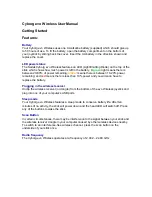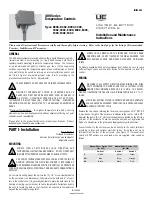
Section 2
General Information
General Information 2-1
MN722
Overview
The Baldor Series 22H Line Regen Vector Control provides full motoring and line
regeneration to the AC power mains with a near unity power factor. The control uses
PWM controlled by IGBT power transistors in both the converter and inverter sections of
the control to provide 3 phase power to the motor and Regen power to the line. Flux
vector technology (sometimes referred to as Field Oriented Control) is a closed loop
control scheme that adjusts the frequency and phase of voltage and current applied to a
three phase induction motor. The vector control separates the motor current into it’s flux
and torque producing components. These components are independently adjusted and
vectorially added to maintain a 90 degree relationship between them. This produces
maximum torque from base speed down to and including zero speed. Above base
speed, the flux component is reduced for constant horsepower operation. In addition to
the current, the electrical frequency must also be controlled. The frequency of the
voltage applied to the motor is calculated from the slip frequency and the mechanical
speed of the rotor. This provides instantaneous adjustment of the voltage and current
phasing in response to speed and position feedback from an encoder mounted on the
motors’ shaft.
The Line Regen vector control provides several advantages over non-regenerative
drives:
Regenerated energy from the motor is returned to the power source. The
control can provide regenerated energy absorption up to it’s full rating on a
continuous basis.
Input current is controlled to be a near unity power factor at rated load.
Line harmonic distortion is reduced.
DC Bus voltage is always controlled. Therefore, line voltage transients do not
affect the output voltage to the motor.
The Baldor Series 22H control may be used in many different applications. It may be
programmed by the user to operate in different operating zones. It can also be
configured to operate in a number of modes depending upon the application
requirements and user preference.
It is the responsibility of the user to determine the optimum operating zone and mode to
interface the control to the application. These choices are made with the keypad as
explained in the programming section of this manual.
Summary of Contents for 22H series
Page 5: ...Section 1 General Information iv Table of Contents MN722...
Page 105: ...Section 1 General Information 5 22 Troubleshooting MN722...
Page 109: ...Section 1 General Information 6 4 Manual Tuning the Series 22H Control MN722...
Page 137: ...Section 1 General Information A 8 Appendix A MN722...
Page 138: ...Appendix B Appendix B 1 MN722...









































